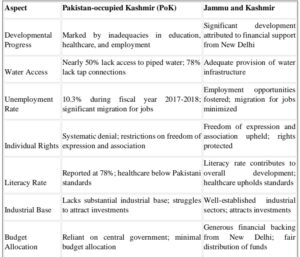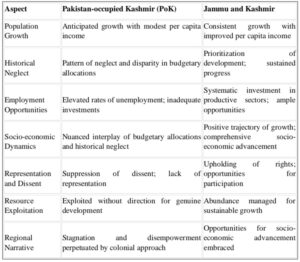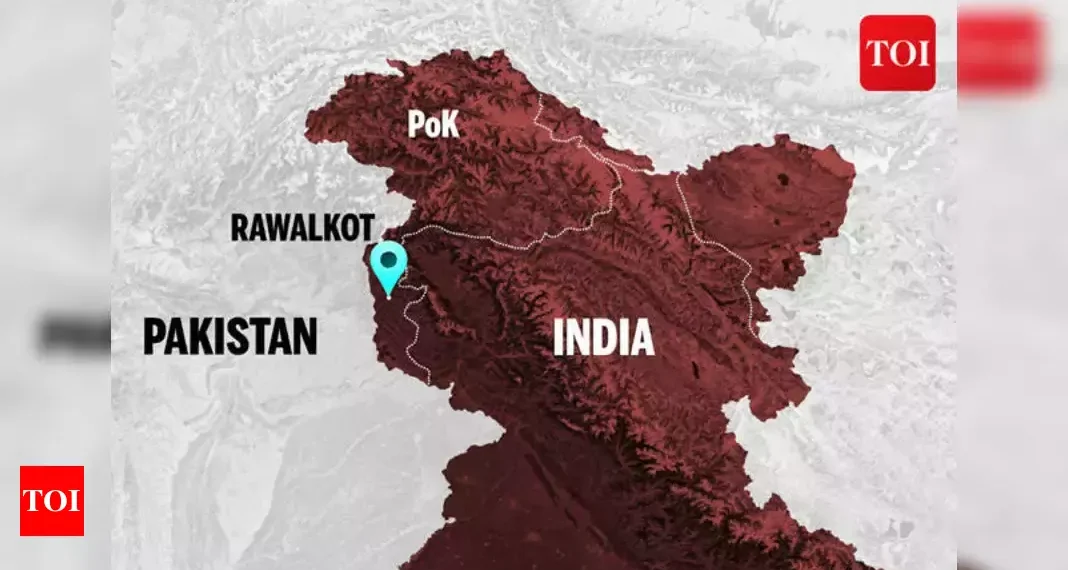Barkat Rasool
The situation in PoK (Pakistan-occupied Kashmir) has reached a critical juncture, with every aspect of the region having descended into chaos. From infrastructure to governance, every organ seems to be in a state of shambles, leaving the populace in a state of shock and dismay. One of the primary concerns plaguing the region is the implementation of government policies, which have failed to address the needs and aspirations of the people. The recent power crisis serves as a stark reminder of this failure, exposing the government’s negligence towards the basic necessities of its citizens. As homes and businesses grapple with prolonged power outages, it has become increasingly evident that the authorities in Pakistan view the people of PoK with disdain and prioritize their own interests over the well-being and development of the region.
Shaukat Ali Kashmiri, Chairman of the United Kashmir People’s National Party, underscored the dire predicament faced by the populace of Pakistan-occupied Kashmir (PoK) and Gilgit-Baltistan during the 55th session of the United Nations Human Rights Council (UNHRC). He narrated the turbulent period surrounding the construction of the Mangla Dam, which ignited widespread protests across PoK. In a bid to quell the upheaval, the Pakistani administration pledged 300 to 400 megawatts of complimentary electricity for PoK. However, despite assurances of land or compensation for displaced individuals, numerous claims remain unaddressed, leaving many in a state of despair.
Currently, all dams in PoK produce hydroelectricity, and oppressive taxes imposed on already exorbitant utility bills have ignited persistent protests, with locals demanding free electricity. The people of PoK are not just yearning for gratuitous handouts but are grappling with the scarcity of basic necessities, elevating their plight to a struggle for survival. The stranglehold of the Pakistan Army over major businesses has further compounded the distress of the populace in Gilgit-Baltistan, while the adverse environmental impact of the China-Pakistan Economic Corridor (CPEC) has left local communities reeling. Despite promises of development, CPEC initiatives have failed to offer any tangible benefits or job opportunities to the people of GB, exacerbating their grievances. As shortages of essential commodities persist, the plight of the people of PoK and GB has reached a critical juncture, underscoring the urgent need for intervention to alleviate their suffering.
PoK grapples with environmental crises stemming from resource exploitation, a consequence of Pakistan’s forcible invasion in 1947. Designated by the United Nations and international bodies as ‘Pakistani-controlled Kashmir’, this region has long been neglected in terms of development. The local populace faces both internal and external challenges, enduring deprivation of government initiatives and suppression of their rights to speech and expression. Frustrated by political and socioeconomic grievances, they resort to mass protests, highlighting the Pakistani government’s infringement upon their fundamental rights. PoK languishes in underdevelopment, lacking basic infrastructure, technology, employment opportunities, and investment. The heavy-handed tactics of the Pakistani army further exacerbate the situation, using coercion and military might to stifle dissent and manipulate the democratic process. Their actions have perpetuated poverty and deprivation in PoK, transforming it into a breeding ground and training base for terrorists. Meanwhile, voices advocating for PoK’s integration with India continue to grow louder, citing the development, technological advancements, and higher standards of living experienced by Kashmiris on the Indian side.
Jammu and Kashmir stands as a beacon of development and progress, notably distinguished from its counterpart, Pakistan-occupied Kashmir (PoK). Benefiting from generous financial backing and strategic support from the Indian government, Jammu and Kashmir has witnessed significant advancements across various sectors. The region boasts adequate provision of essential services such as education, healthcare, and infrastructure, ensuring a high quality of life for its residents. Employment opportunities flourish, with thriving industrial sectors attracting investments and fostering economic growth. Moreover, rights and freedoms are upheld, allowing for vibrant civil society engagement and political participation. The proactive approach towards development has transformed Jammu and Kashmir into a model of socio-economic prosperity, setting it apart from the historical neglect and systemic challenges endured by PoK under Pakistani administration. This stark contrast is evident in the data provided in the table below:


The table provides a comprehensive comparison of various socio-economic indicators between Jammu and Kashmir and Pakistan-occupied Kashmir (PoK). It highlights significant disparities between the two regions. Jammu and Kashmir emerges as a region with substantial developmental progress, attributed to generous financial support and strategic backing from the Indian government. This support has led to advancements in essential services such as education, healthcare, and infrastructure, ensuring a high quality of life for its residents. Additionally, flourishing industrial sectors have created ample employment opportunities, contributing to economic growth. Moreover, rights and freedoms are upheld, fostering civil society engagement and political participation. In contrast, PoK exhibits a lack of development, marked by inadequate provision of services and limited economic opportunities. Historical neglect and systemic challenges under Pakistani administration have hindered PoK’s progress, resulting in disparities when compared to Jammu and Kashmir. This analysis underscores the stark contrast in socio-economic conditions between the two regions, emphasizing the need for equitable development and support for PoK’s residents. The contrast between the two regions serves as a stark reminder of the divergent paths they have taken. While Jammu and Kashmir have experienced notable growth and development, marked by advancements in various sectors, Pakistan-occupied Kashmir (PoK) has witnessed a decline in its socio-economic conditions. This disparity underscores the deterioration that has occurred in PoK, characterized by inadequate provision of services and limited economic opportunities. In contrast, Jammu and Kashmir.
(Barkat Rasool is a researcher based in Kerala who explores the intricacies of Kashmiri politics in his writings.)


